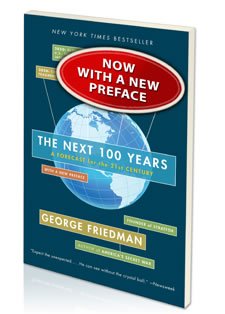
The Next 100 Years in HR & Recruiting?
Reviews: The Future
The research for the Five Scenarios project is sponsored by Pinstripe Talent. (We could still use an additional sponsor, please check in with me). As a part of the project, I’ve been digging into lots of ideas about the coming years.
Right now, there are a number of interesting books that lay out a range of stories about how our future will unfold. I’ve plowed through about a dozen of them as a foundation for the Five Scenarios Series. So far, the most interesting come from very diverse grounding, politics and vision.
Jeff Rubin is a Canadian economist who predicted soaring oil prices back in 2000. His book, Why Your World Is About to Get A Whole Lot Smaller: Oil and the End of Globalization describes a near term future in which a barrel of oil goes for $200. In his view, soaring energy costs dismantle the global economy and send us back to local, simpler circumstances.
“We must reengineer our lives to adapt to a world of increasing energy scarcity. And that means learning to live using less energy. While much could go wrong in that transition, don’t be surprised if we find more than a few silver linings. And don’t be surprised if the newer smaller world that emerges isn’t a whole lot more livable and enjoyable than the one we are about to leave behind”
Rubin, echoing the slow food, local movement, idealizes our rustic past and sees little choice but to adapt to the harsh reality that the last centuries have been subsidized by cheap energy. He imagines a future with more repair persons and fewer foreign goods. Expensive food and hitch hiking dot the landscape of our coming years.
Stewart Brand, who co-founded the Global Business Network (where scenario planning was perfected) with the Shell team that forecast the last oil price disruption, sees a happier (somewhat warmer) future in Whole Earth Discipline: An Eco Pragmatist Manifesto. Brand, who is sort of the god father of all hippiedom, sees a future of mini-nukes, urban innovations, climate management and genetic engineering of the food supply. It’s somewhat odd that the former advocate of Rubin’s view is now suggesting a back to the city future.
But, Brand has a nearly magical ability to sense the shifting winds of pop culture and therefore the future we are experiencing. For Brand, the leveling of population growth (something this audience has understood for decades) is the trump card in the global warming debate. He trusts the human desire to have a better life as the engine of innovation for the coming century.
While Whole Earth Discipline is really a guide for long term thinking, Brand dots his vision of the future with an amazing array of anecdotes from the scientists who are shaping that future.Of the three works, Whole Earth is the one that respects it’s reader’s ability to think.
If Brand represents the fringe middle, Rubin has the left covered. George Friedman‘s book comes complete with Lou Dobbs’ quotes. Tackling the pure geopolitical view, Friedman dissects history like he was slicing cheese. A smooth and compelling narrative have you swallowing his non-annotated analysis like it was fruit juice.
To Friedman, we are at the very beginning of the American Era. Pooh poohing America’s tendency to see a dismal future, he disassembles the current china bashing with a geographical analysis (China is incapable of deploying an adequate Navy). Like Brand, although more assertively, he sees the population slowdown as the cure for warming.
The book rips through a future that includes another war between Japan and the US, Mexico as a prominent superpower, the importance of encouraging immigration and Turkey as the upcoming leader of the Islamic States. Poland will become the center of Eastern Europe.
The Next 100 Years: A Forecast for the 21st Century, Friedman’s book ignores stated political views and conventional wisdom to paint a picture of a world driven by long historical trend. Essentially, he says that what matters are historic variables generated by geography.
Taken together, the three books provide an interesting a blanched set of opinions on the issues that matter over the next 100 years.
Now, ask yourself, when was the last time anyone in HR or Recruiting talked about the next 100 years.











